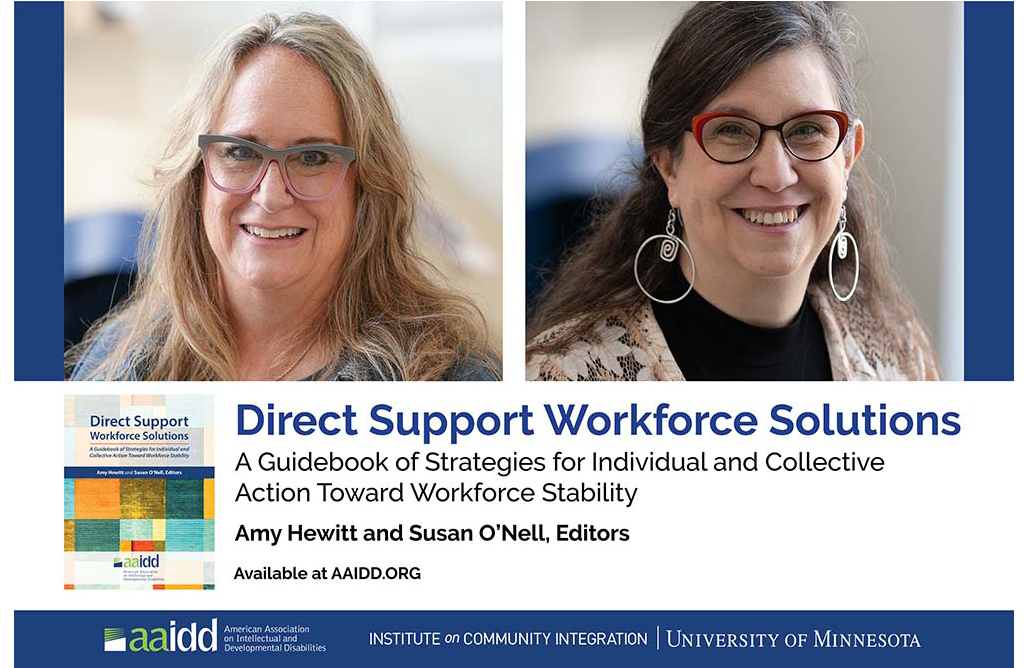The American Association on Intellectual and Developmental Disabilities (AAIDD ) recently released a compelling new guidebook for tackling the urgent issues facing the workforce that supports people with intellectual and developmental disabilities (IDD).
Direct Support Workforce Solutions: A Guidebook of Strategies for Individual and Collective Action Toward Workforce Stability, edited by Amy Hewitt and Susan O’Nell, features powerful individual stories of dedicated professionals and proven ideas for reducing persistently high turnover and vacancy rates in the field.
Hewitt, director of the Institute on Community Integration, and O’Nell, director of the DirectCourse workforce training curriculum, presented details about the new resource at AAIDD’s recent annual meeting in Arlington, Virginia.
“Interest in the work was strong at the conference and beyond because we’ve had success in demonstrating you can reduce turnover, despite many people thinking it is not possible,” Hewitt said. “And it’s not solely about higher pay, though of course, wages matter.”
Stories from direct support professionals (DSPs) who support people with intellectual and developmental disabilities are included, as are strategies to help service providers and other employers retain high-quality staff members. Among them: high-impact training, recruitment, credentialing, data use, and elevating the professional status and wellbeing of DSPs.
“This book brings together decades of experience and knowledge from the field to create change in how we reward and regard the essential professionals who support people with IDD,” said Margaret Nygren, AAIDD’s executive director. “At the individual and collective levels, it addresses the dire workforce challenges we face and is an important contribution to the field.”
The book shares knowledge from Hewitt, others at ICI, and around the field about tracking workforce data, structuring pay rates, improving marketing and recruiting strategies, credential programs, and more. More than 20 ICI colleagues authored or co-authored chapters.
ICI has a national consulting group, Direct Support Workforce Solutions (not affiliated with the book), that offers individualized evaluation and strategy development for attracting, recruiting, and retaining talented DSPs.
The consulting work and ICI’s contributions to the new AAIDD book demonstrate four decades of progress in workforce building, Hewitt said.
“It feels good to be able to share many of the strategies that are working for service providers and for a number of states,” she said. “But it’s challenging to make a dent in a very large industry that faces a number of serious threats.”
Chapter authors include Mary Lou Bourne , founder of Person Centered Consulting; Ann Hardiman, New York Alliance for Inclusion & Innovation; Bethany Toledo, executive director, Ohio Alliance of Direct Support Professionals; Carol Britton Laws, disability studies professor at the Institute on Human Development and Disability, University of Georgia; and Shelia Fesko, former director of the School for Global Inclusion and Social Development at University of Massachusetts Boston.
The foreword, written by Liz Weintraub and Charlie Lakin, urges readers to adopt the strategies and take collective action in order for the country to make good on its promises to people with disabilities in federal and state law that they can live in their communities and not institutions.
“Much of what we can do is contained in the pages of this book,” they wrote. “But, of course, books do not have legs and cannot march. They do not have voices and cannot call their representatives in government. They cannot tell people who provide support how much we appreciate what they do. There is much to do that is described in this book, and there is much to do after we have read it.”
View Original Article











